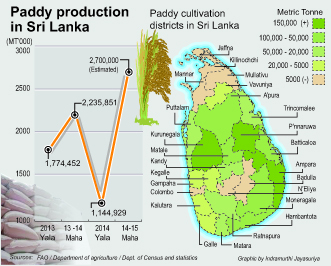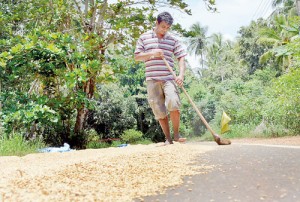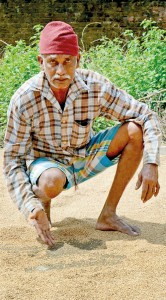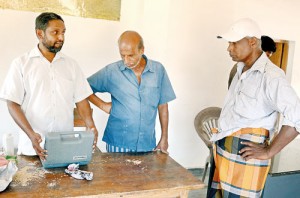News
Farmers wilt under paddy prices
Observing at midday on Monday an overcast sky that threatened to wash away his hard work this Maha season, farmer H. Karunadasa decided to sell his paddy to a private mill owner, S. M. M. Seeras.
Sifting though Mr. Karunadasa’s paddy sample, the private mill owner claims that the moisture level is too high. When asked what price he could offer, he ponders for a moment and says although the paddy is too wet to store, he would buy it at Rs. 34, mainly because of Mr. Karunadasa’s insistence.
The price is Rs. 11 less than the government- guaranteed price of Rs. 45 for nadu. Disappointed but having little choice, Mr. Karunadasa agrees to the price.
Having tried to dry his paddy for one and a half days, Mr. Karunadasa says he managed to bring the moisture level down to 17.5 percent. If he was to sell it to the government he would have had to dry it further till the moisture level dropped to 14 percent.
“I had to hire two people paying Rs.1000 a day to dry it to this level. I don’t have a proper place or a ‘kamatha’ to dry the paddy and it has been raining so much I may not be able to dry it. I needed the money to pay back the loans,” he explained.
The private mill owner has a drying machine which dries the paddy within a few hours to the moisture level of 14 percent, required for storage purposes. It costs him about Rs. 2000-3000.
Two more farmers arrive at the mill to get the samples of their paddy tested and sell their produce. The grain moisture test meter marks 17 percent for one and 20 percent for the other. The farmers reluctantly agree to sell at whatever price Mr. Seeras names.
This is the type of situation facing farmers in the predominantly rice-growing districts of Anuradhapura, Polonnaruwa and Ampara.
Although the government announced that the guaranteed price for a kilo of Nadu was Rs. 45 and Rs. 50 for Samba, the market price remains at

Desperate farmers dry paddy on the road
30 -35 for Nadu and Rs. 35- to 41 for samba in most areas. Farmers fear the price would fall further as harvesting continues.
Unexpected rain
The unanticipated showers experienced in Polonnaruwa and Anuradhapura have added further hardship on paddy farmers. Rains during harvest time could ruin the quality of the paddy. The damp soil in the fields has made it difficult to use harvesting machines, requiring the farmers to get the services of helpers at Rs.1000 a day.
When Saman Kumara tested a sample of his paddy for moisture the meter reading indicated 13.5 percent. Happy that his paddy stock would be accepted by the PMB he took it to the PMB stores the following morning. Unfortunately the moisture level had risen to 14.6 percent and his stock was rejected.
“I had to hire help to harvest as I couldn’t use the machine, I needed to pay the people. I also couldn’t afford to transport the paddy again. So on my way I sold the paddy to a private mill owner,” he lamented.

Chandrasekara Ranaweera : President of the farmer association in the area is also struggling to dry his paddy to the required moisture level. Pix by M.D. Nissanka
Mr. Kumara got only Rs. 34 per kilogram for his 200 kg of paddy. The sole bread winner for a family of five he had no choice but to sell.
Many farmers who, like Mr. Kumara, lack proper storage facilities face this hardship of not able to dry their paddy.
No driers, no guaranteed price
One cannot enter the premises of the Paddy Marketing Board (PMB) of the Parakramasamudra Project in Polonnnaruwa without stepping on paddy spread out to dry in the sun. Over 10 farmers present here are hoping their paddy would be dry by evening.
D. M. Lokubanda (57) has been camping at the premises for several days determined to sell the paddy to the PMB. However, everytime he checked a sample for moisture the meter reading was 17 percent or more. On Tuesday he put out his paddy to dry for the fourth day, hoping against hope he would be able to sell it.
“I brought the paddy on Saturday to sell but the moisture level was too high. It cost us Rs.2000 to transport the paddy here, so we cannot afford to take it back and forth. So the paddy is kept here and I sleep here with the paddy to guard it. Elephants came very close to the premises last night, very soon they will try and come inside as well,” he said.

Awaiting the verdict: Farmers look on as private mill owner S. M. M. Seeras checks the moisture level in their paddy samples
“I was offered only Rs.30 for nadu when I tried selling it outside,” he added.
He had already sold 2000 kg of Samba at Rs 41to a private mill owner as the stock was rejected by the PMB. Unable to bear the cost of another trip to the PMB he had sold it to a private mill owner.
Only 5% of the total production
The stories of other farmers struggling to dry their paddy at buying points are similar. Chandrasekara Ranaweera, the president of the farmer association in the area is also struggling to dry his paddy to the required moisture level.
He farms 10 acres and harvests over 10,000 kg of rice, but the PMB will only buy 2000 kg from each farmer. Farmers are therefore forced to sell the rest of their produce in the open market.
Meanwhile the Agriculture Department predicts apaddy production close on four million metric tonnes this Yala season. But the PMB plans to buy only 200,000 metric tonnes.
Justifying this decision, Food Security Ministry secretary P.H. J.B. Sugathadasa, said the role of the PMB was that of a regulator of the paddy market.
“We have always bought only 6 to 7 per cent of the paddy production each season even when the PMB was first established”.
He also said that paddy stocks that farmers bring could get rejected due to high moisture content.
“We are paying a premium price for paddy and we have to adhere to strict quality control. There should be some form of regulation,” he said.
Many farmers claim that the guaranteed price has not given them the expected results.
“Even though the government pays Rs. 45 others pay only Rs. 32 to 35. The guaranteed price is only in name. Farmers are struggling to dry the paddy to obtain the required moisture level in bad weather conditions. You see them drying their paddy even on tarred roads,” Mr. Ranaweera said. He said a proper mechanism should be in place at PMBs where there were sufficient driers so that farmers could dry their paddy, or alternatively the PMB should dry the paddy stocks before storage.
Many farmers also felt the government should impose a minimum paddy price.
“This way both the farmer and the consumer are protected,” All Ceylon Farmers’ Association Vice President Susantha Nawarathne said.
“Now the mill owners buy the paddy at rates as low as Rs.30 but increase the price of rice citing the guaranteed price given by the PMB. So the consumer is robbed as well. Right now only the mill owners benefit,” he said.
However the Food Security Ministry does not agree with this point of view.
“For any scheme to work one has to be able to implement it practically. How can you impose a minimum price, where there is no mechanism to ensure the quality of paddy and other related issues,” Mr. Sugathadasa said.

